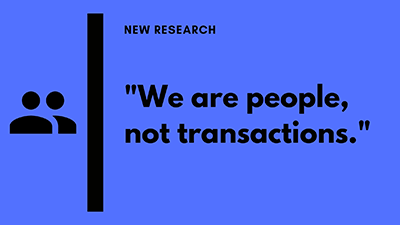Cultivating trust with LGBTQ publics
May 7, 2019

By Leah Tobia, Page Center intern
To this day, you can be fired for identifying as LGBTQ in over 30 U.S. states. Research shows that to enhance trust in conversations, organizations should first understand and acknowledge their publics, and then implement policies and procedures.
With funding from the Arthur W. Page Center, Erica Ciszek, assistant professor at the University of Texas at Austin, conducted a study that focuses on building relationships through the concept of trust. The study, “’We are people, not transactions:’ Trust as a precursor to dialogue with LGBTQ publics” was published in Public Relations Review in April.
In order to successfully communicate in the workplace, trust must be established. Ciszek's study contributes to the body of research in public relations and public interest. More specifically, it relates to historically marginalized populations, in this case, LGBTQ.
“The funding for this study has allowed me to explore these personal, professional, and scholarly areas of inquiry that have really shaped my experiences as someone who has worked in PR and advertising,” Ciszek said.
The results from this study focus on four areas as they relate to organizations fostering trust with LGBTQ publics and populations.
Cultural competency
The first major takeaway is the need for organizations to have cultural competency. According to the study, organizations should be well versed in attitudes, beliefs, values, preferences, lifestyles, decisions and trends regarding people who identify as sexual and gender minorities.
Bridging internal policies with external efforts
An organization that wants to engage with LGBTQ publics externally needs to also have internal policies and procedures that mirror those external efforts. For example, Target can promote a transgender campaign since they invite transgender team members to use the restroom and fitting room facilities that they identify with.
Organizational authenticity
Ciszek says that organizational authenticity was the third area that came about from the study. Authenticity relates to demonstrating a desire to engage in dialogue with those part of the LGBTQ community.
Stakeholder empowerment
According to the interviewees, there is a need for stakeholder empowerment, which includes making space at the decision-making table for LGBTQ individuals. Their voices should be heard, and space needs to be made for them.
The study was carried out through in-depth interviews with 33 practitioners across various sub fields of communication. The interviewees ranged from professionals with 45 years of experience in strategic communications to more junior level professionals with four to five years of experience.
In the last 30-40 years there have been drastic shifts in public opinion about same sex marriage, a highly socially sensitive issue. Most recently, the Supreme Court has accepted three cases that address sexual orientation and gender identity in workplaces. The cases will begin their hearings in October.
Although there has been progress, Ciszek said, “there are still question marks as it relates to how businesses and organizations utilize communication and strategy.”

